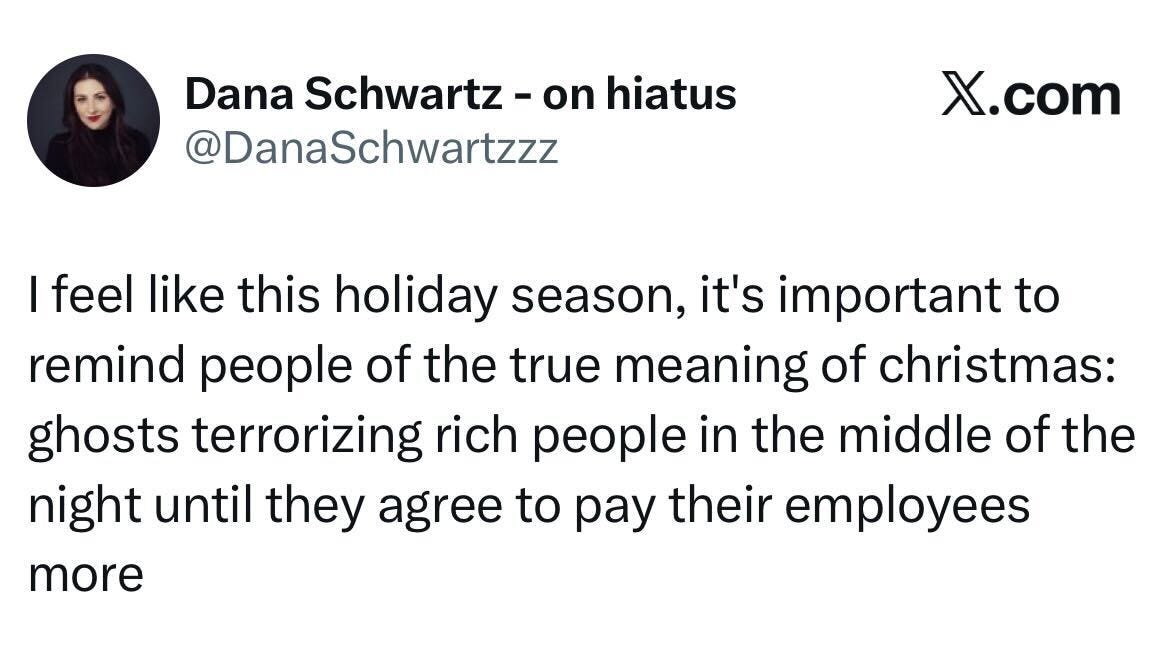Tis the season to win debates with your relatives — here's how
Seven common arguments against student debt relief & how to combat them
It’s the holiday season, and you know what that means: political conversations with family members around the dinner table, on the couch watching football, or on long drives to your grandparents’ house. Heaven forbid you’ve got MAGA family — that’s a doozy, but please don’t give up hope!
Even if your folks are more liberal-leaning, you might still find yourself in cringe-worthy convos about the affordability crisis. Although it might be obvious to you why cutting back on avocado toast isn’t going to help anyone get out from under a ballooning student loan balance, you’d be surprised by how propagandized your folks are.
The ultra-rich benefit from the normalization of personal responsibility rhetoric, which means that small talk about economic justice can actually lead to big shifts in thinking. That’s why we’ve compiled some helpful responses to make discussions more meaningful and steer chats with loved ones away from trickle-down-delusion and towards clarity and empathy.
Since the ghost of Ronald Reagan continues to haunt the American psyche, a lot of well-meaning liberals love to parrot the same failed talking points over and over — so let’s unpack them!
Popular arguments against student debt cancelation
1. “You took out a loan; you should pay it back.”
Ah, yes, this argument is a classic that refuses to die. We’ve been hearing about it for almost a decade. The problem is, our economy doesn’t work that way. Rich people take on debt all the time and never pay it back. In fact, this debt is a key mechanism that they use to build wealth.
Here’s how you can respond. Illuminate the power imbalance that’s at play here, which includes the predatory nature of the economy and the entire student loan system. It isn’t as if student debtors asked their neighbor to borrow $20 (you should always try to pay your neighbor back like you promised). Most student debt is owed to the federal government—the biggest bank on the planet.
When wages stay stagnant for decades while tuition and housing costs skyrocket, “personal responsibility” arguments collapse. This isn’t about individual morality — it’s about systemic exploitation.
An additional counter to personal responsibility framing is to point out that student debt is one of the few types of debt that borrowers cannot escape through bankruptcy. Student loan debtors — many of whom took on a massive loan before their prefrontal cortex was fully developed — don’t have the luxury of pivoting. Imagine if a 19-year-old tried to start a business and was awarded a $100,000 loan. Wait, you can’t imagine that because that literally doesn’t happen.
2. “They shouldn’t cancel all the debt — just lower the interest rates.”
The lowering of interest rates as a “solution” to the student debt crisis is underwhelming. It’s like if someone said, “I don’t mind getting screwed over, as long as it’s gentle and slow and preferably to R&B music.” You’re still getting screwed, though, right?
The reality is that lowering interest rates is like placing a Band-Aid over a gaping wound.
The student debt crisis isn’t just about the interest rates; it’s about making what should be a public good — quality education — into a debt trap. Most borrowers pay for decades without seeing their balances go down. Mass debt cancellation is about ending the cycle of financial servitude, not making debt peonage terms slightly softer.
3. “You better start paying your student debt back — Trump will never cancel student debt.”
Never say never. Debt Collective has been organizing for student debt cancellation since what was dubbed “T-day,” the day the student debt crisis hit one trillion dollars. We’re now closer to 2 trillion. That means, we’ve been organizing under Obama, Trump, Biden, and now Trump again.
Ironically, Trump initiated the pause on student loan payments during the onset of the COVID-19 pandemic, a move that had a positive impact on millions of households. As disparaging as our current political moment is, it’s also full of openings — think The New Deal after the Great Depression, Occupy Wall Street organizing as a response to the 2008 Recession, or the Eviction Moratorium after the onset of the COVID-19 pandemic. These responses demonstrated the power the government has to provide economic stimuli for the working class.
Still, it’s important to remember that lasting political wins don’t come from the state — they’re won from the ground up. We’ve got to organize and demand not only mass student debt relief, but college for all. The future depends on it.
4. “Canceling student debt costs taxpayers money.”
This argument is popular amongst conservatives. Why do they love this framework so much? Because it traps the conversation in a nonsensical dance about who is or isn’t a “taxpayer” and what we should or shouldn’t be paying taxes for. Newsflash: student loan borrowers — who make up 1 in 4 Americans — are also taxpayers. This fact throws a wrench in this entire argument.
A more recent counter-point is that when Biden canceled $187 billion in student debt, taxes didn’t go up. Debt cancellation isn’t about withdrawing from a massive taxpayer fund — it’s about the government choosing not to collect on meaningless debt it already owns, and will likely never collect on anyway.
5. “Canceling all federal student debt would increase inflation.”
So scary! *looks at grocery bill* Wait! But my groceries are already expensive?!
This argument has been repeated endlessly and it’s baseless. Economic boosts from the ground up actually strengthen the economy with minimal levels of inflation. Think about it — if people aren’t drowning in debt, they can then spend money on housing, groceries, and other necessary household items.
Meanwhile, we’re already living through “greedflation,” as corporations increasingly price-gouge consumers and drive up food costs. We’ve got bigger fish to fry than a hypothetical, marginal inflation bump.
6. “The Supreme Court struck it down. Canceling student debt is illegal.”
Not true. The case against student debt relief barely pretended to make sense.
Has anyone noticed the Supreme Court is ruling from the bench and has all but lost legitimacy as a moral or legal authority? The truth is, student debt relief is legal. Any president has the power to cancel all federal student debt using the Higher Education Act of 1965. In fact, the president has a Swiss Army knife of legal options to administer widespread student debt cancellation. It’s always been within executive authority.
7. “They’ll never collect on this debt anyway.”
That’s… actually true. The federal government knows most federal student debt will never be fully repaid, which is why they discharge student debt when a borrower dies and have a bevy of cancellation programs that incentivize non-payment.
So the question becomes: why keep up the charade? Why not cancel the debt now and let people live more fulfilling lives? Because these debts are less about money and more about social control.
Reframe the Conversation
A key takeaway is to avoid getting stuck inside your relatives’ moral framing of unjust debt, which insists that paying debt back is about virtue or responsibility.
Instead, you can shift their perspective entirely. Remind them that Americans have been trained to have a limited imagination about what their government can do for them. In the 1960s, the U.S. government seriously proposed expanding free public education from kindergarten through 14th grade and adding two extra years of community college. Education was seen as a public good, not a profit center. College isn’t solely about getting a job. It’s about the essence of what builds a liberatory society: expanded literacy, curiosity, critical thinking skills, and access to abstract ideas.
Student debt relief is about our right to learn, to imagine, and to build a more equitable society.
So instead of trying to “win” arguments at all, focus on expanding the frame of what’s possible in the conversation. This is how you win people over.
These holiday conversations don’t have to end in frustration. They can be opportunities to plant seeds, to shift perspectives, and to remind people that mass debt cancellation isn’t even that radical. It’s just common sense.
Learn more about the origins of the student debt crisis from our recent Jubilee School session with Ryann Liebenthal, author of Burdened: Student Debt and the Making of an American Crisis.
If we’ve missed any arguments you’ve heard about student debt, let us know in the comments below!




